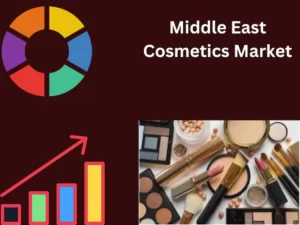© 2024 All rights reserved
Datavagyanik- Your Research Partner

In the Middle East, the popularity of cosmetics has grown significantly for many reasons. The demand for beauty goods is particularly high in the area since people there place a great value on appearance and personal care. Also, there is an increase in the usage of cosmetics due to the growing trend of beauty consciousness, particularly among women.

The warm environment in the Middle East is another factor in the region’s cosmetics popularity. Cosmetics like sunscreen, moisturisers, and oil-absorbing powders are needed for daily use because the hot weather can cause problems including greasy skin, dryness, and UV damage.
The Middle East is also home to a large expatriate community, with many individuals coming from countries with strong beauty cultures. This has led to an influx of beauty products and trends from around the world, with consumers in the Middle East often seeking out new and innovative products to add to their beauty routines.
Most of the cosmetics imported to the Middle East come from the US, Europe, and Japan.
The Middle East is estimated to be the third-largest retail market for skincare products.
The Middle East is the largest market for halal cosmetics in the world.
In recent years, there has also been a shift towards more natural and organic beauty products, as consumers become increasingly aware of the potentially harmful effects of certain chemicals in cosmetics. This has led to a surge in demand for natural and organic cosmetics, particularly among younger consumers.
Overall, the popularity of cosmetics in the Middle East can be attributed to a combination of cultural values, climate, global influences, and a growing focus on natural and organic products.
Cosmetics are substances that are used to improve or preserve one’s look. They can be used for a variety of things, such as makeup, scent, and other things like skin and hair care. In recent years, cosmetics have grown in popularity in the Middle East, where both men and women use them for self-expression and personal grooming.
Shampoos, conditioners, hair masks, and hair oils are examples of hair care products that assist nourish and preserve the health of the hair. Skincare items including moisturisers, cleansers, toners, and serums aid in maintaining the health and hydration of the skin. Cosmetic items like foundation, lipstick, eyeshadow, and mascara are used to improve one’s appearance, achieve a particular look, or conceal imperfections.
In addition to these traditional categories, there are also a variety of speciality cosmetics available, such as anti-ageing creams, hair dyes, and perfumes. Men’s grooming products, including hair and skin care, are also becoming increasingly popular in the Middle East.
Cosmetics are widely available in the Middle East through various retail channels, including department stores, speciality stores, supermarkets, and online retailers. Many international and local brands compete in this market, with some of the most popular brands including L’Oreal, Estee Lauder, and MAC.
In conclusion, cosmetics have become an important part of daily grooming routines for many people in the Middle East, with a wide range of products available to suit individual preferences and needs.
The cosmetics market in Saudi Arabia is expanding rapidly due to the rising disposable incomes of the population. This has resulted in an increased demand for beauty products, which is further fueled by the presence of a young population and rising social media usage. Additionally, the government has implemented various reforms to make the market more attractive to investors and businesses, such as the introduction of a Value-Added Tax (VAT). These reforms have helped to create a more favourable environment for the growth of the cosmetics market in Saudi Arabia.
The cosmetics market in the UAE is growing for several reasons. Firstly, an increasing number of tourists and ex-pats in the UAE has created a large demand for personal care and beauty products. This is further fueled by a strong retail sector, with several high-end stores catering to the growing demand. Additionally, the UAE government has taken steps to encourage the growth of the cosmetics industry, with various initiatives and investments in the sector. This has helped to create a more favourable environment for the growth of the cosmetics market in the UAE.
The middle east Baby Care Products market has been segmented By Category and By Gender.
Based on the By Category, the middle east has a Baby Care Products market Hair Care, Skin Care, Makeup, and Others. In 2021, the hair care segment held a significant share. The segment was driven by growing consumer awareness about personal grooming, increasing disposable income, and the availability of a wide range of products. Hair care products such as shampoos, conditioners, gels, and serums witnessed high demand from consumers, resulting in increased sales. This demand is expected to continue to grow in the years to come, as more and more consumers are likely to become aware of the importance of using quality hair care products. For instance, manufacturers are focusing on developing innovative products, such as shampoos with natural ingredients and conditioners that help reduce hair damage and hair fall.
Based on Gender, the market is classified as cosmetics for Men and Women. In 2021, the segment is expected to account for a significant share of Women. Women are increasingly driving the growth of the market as they become more aware of the importance of self-care and health. Companies are also introducing new products specifically tailored to female needs and preferences. The cosmetics market is expected to be a major contributor to this growth, as more women are turning to cosmetics to enhance their physical appearance and to feel more confident. Along with this, the increasing disposable income of women is allowing them to spend more on personal care products. The growing demand for organic, natural, and eco-friendly products is also driving the growth of the segment.
By Category
By Gender
By Region
“Every Organization is different and so are their requirements”- Datavagyanik







© 2024 All rights reserved
Datavagyanik- Your Research Partner
Add the power of Impeccable research, become a DV client